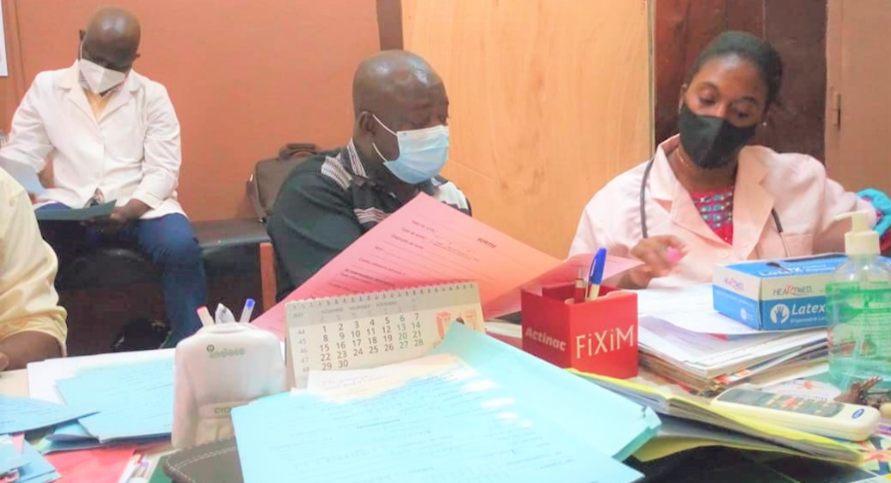Scaling Up Drug and Therapeutics Committees to Strengthen the Rational Use of Antimicrobials in Mali
“Antimicrobial resistance (AMR) is now taken seriously by everyone in the health sector.” Shares Idrissa Diarra, Deputy Director General of the Dermatology Hospital of Bamako.
The irrational use of antibiotics, known to fuel AMR, is a major concern. According to the World Health Organization (OMS), around 50% of all medicines are prescribed, distributed or sold inappropriately.
Mali has been fighting against this situation for decades. In 2018, the country developed and approved a multisectoral national action plan to combat AMR that included several activities such as providing guidance to hospital practitioners and supervising medicine prescribing practices. For this reason, it was important to implement drug and therapeutics committees (DTC) in health facilities.
DTCs are a proven way to reduce inappropriate practices and to promote sound management of medicines among health care professionals. After a successful piloting phase, a scaling up process is helping the committees become an integral part of Mali’s pharmaceutical management.
Piloting the Implementation of Drug and Therapeutics Committees
The US Agency for International Development (USAID), through its Medicines, Technologies, and Pharmaceutical Services (MTaPS) Program, supported the Directorate for Pharmacy and Medicines, the National Agency for Hospital Assessment, and the National Multisectoral Coordination Group for AMR to pilot the implementation of Mali’s first DTCs in five sites in 2020: the Point G hospital, the Mère-Enfant hospital, the Sikasso hospital, the Ségou hospital, and the Koutiala Centre de Santé de Référence.
MTaPS helped implement the DTCs through activities such as the development of terms of reference for committees and training modules for its members, and building the capacity of facilitators and master trainers on the AWaRe classification—WHO’s categorization of antimicrobials to guide their appropriate use—and the functioning of the committees.
This pilot approach enabled the implementation of guidance for the national pharmaceutical policy and management of antibiotics use to combat AMR in all sites. Following the positive results, the Directorate for Pharmacy and Medicines, the National Agency for Hospital Assessment, and the National Multisectoral Coordination Group for AMR, with MTaPS’ support, initiated scaling up the approach to 11 other health facilities.

Training workshop for the members of the therapeutics committee of Kayes. Photo credit: Ousmane Traoré, MTaPS
Scaling Up the Implementation of Drug and Therapeutic Committees
MTaPS used the experience of the first five committees for training of staff in the different health facilities, and developed and implemented action plans for the committees in the 11 facilities.
But training staff wasn’t enough to ensure the success of the committees as there are many issues that impact the health system in Mali including a lack of personnel and high turnover.
To counter the challenges, MTaPS worked with the DTCs to provide supervision visits to strengthen their visibility in health facilities, discuss the implementation of action plans with committee members, evaluate the indicators of antibiotic prescription, and exchange on the issues and propose solutions. In spite of all these challenges, the work achieved with MTaPS support enabled 82 out of 184 trainees (45%) to stay active in the committees implemented in the 16 supervised facilities and to maintain the level of prescribed medicines in the ‘Access’ class of the AWaRe classification at 56%, close to WHO’s recommendation of at least 60%, a significant achievement since this category regroups the drugs offering the best therapeutic value while minimizing the potential for AMR.
Additionally, the supervision support helped disseminate reference document that will contribute to optimize the use of antimicrobials, including the manual for 2021 on procedures to register and classify human and animal health medicines in Mali.
Many stakeholders were satisfied with the implementation of these committees. Dr. Idrissa Diarra indicates: “All hospitals need this type of committee. On our end, as administrators, we will do everything for the success of this committee.”
To continue to make these actions sustainable and committees functional, MTaPS is working with the Directorate for Pharmacy and Medicines to organize regular supervisions for the implementation of action plans, to assess indicators, and share these results with the central level.
Moreover, DTCs have been included in the National Pharmaceutical Policy and the national schema of procurement of medicines which further entrenches sustainability.

Participants to a workshop for the therapeutics committee of Kangaba. Photo credit: Sanoussi Koné, GHSC-PSM